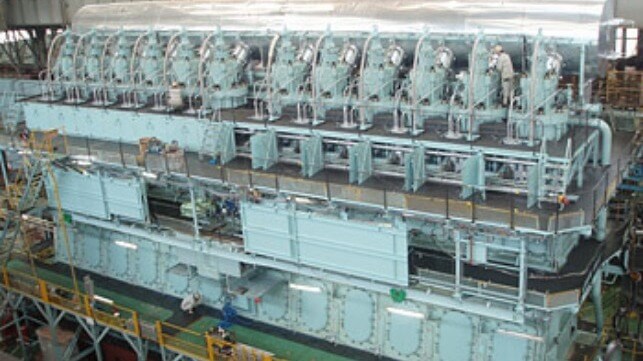Kawasaki Confirms Altering NOx Tests Widening Japan's Marine Engine Scandal

Kawasaki Heavy Industries has become the third Japanese engine manufacturer to confirm a long-term effort to alter the test results of its marine engines to meet required specifications. The company is reporting that the engine’s safety was not compromised but that the altered tests could impact NOx emissions calculations for the engines.
Japan’s Ministry of Land, Infrastructure, Transport and Tourism, requested the company conduct a fact-finding investigation after uncovering similar actions at other engine manufacturers. The long-term practice first became public after a whistleblower in February 2024 revealed that IHI Power Systems had been altering fuel consumption data for decades. In July, Hitachi Zosen also issued a report confirming that it had also discovered altered data from its tests.
The depth of the fraud was highlighted in the internal report from IHI that said more than half the engines shipped did not meet specifications. They found 58 models of marine engines and 40 models of land-use engines were involved. IHI shipped nearly 4,900 marine engines of which 86 percent had altered data. Similarly, Hitachi revealed the practice had been ongoing since 1999 and involved more than 1,300 engines used in vessels sailing around the world.
KHI said today that it received the request for the ministry on July 5 which would be around the same time Hitachi confirmed its altered test results. Kawasaki says it confirmed the misconduct on July 12 and launched a thorough internal investigation.
The company reports that since January 1, 2000, test results were altered for 673 of its two-stroke diesel engines. So far, they have only discovered one instance of altered test results on its four-stroke engine. The engines were for ships being built mostly for international shipowners.
“Specifically, the investigation confirmed that shop trial fuel consumption rates for the company’s marine diesel engines had been altered through the manipulation of testing equipment to keep values within the permissible range of customer specifications and to reduce data discrepancies. This has the potential to impact NOx emissions calculations for these engines,” the company writes in its statement. They said it happened during shop trials and included the verification tests for NOx emissions.

that matters most
Get the latest maritime news delivered to your inbox daily.
The company said it takes the misconduct regarding shop trials “very seriously,” while assuring customers it will work to ensure it does not happen again. A special third-party investigative committee of experts will be established. KHI said the goal is to determine the root causes and formulate and implement measures to prevent the altering of tests in the future.
Kawasaki attests to having the world’s largest two-stroke diesel engine program while complying with IMO NOx emission regulations. The company has been working to expand its leadership in fuel savings and economy for the operation of its popular diesel engines. Its engines are widely used with bulkers and car carriers.
